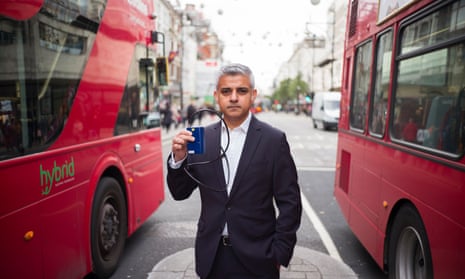Older, dirtier cars will have to pay a £10 pollution charge to drive in central London, according to plans set out by Sadiq Khan on Tuesday.
The charge, on top of the existing £11.50 congestion charge, would apply from 2017 to cars first sold before 2005. The mayor of London’s proposals to tackle the capital’s “toxic” air also include a big expansion of a planned Ultra Low Emissions Zone (ULEZ) and a faster roll-out of cleaner buses.
Cities are growing around the world and air pollution is rising, but some are taking action. In Paris, polluting cars are now banned on weekdays.
“With nearly 10,000 people dying early every year in London due to exposure to air pollution, cleaning up London’s toxic air is now an issue of life and death,” said Khan. “It is the 60th anniversary of the Clean Air Act of 1956, which was passed following the great London smogs of the 1950s. Today we face another pollution public health emergency in London and now it’s our turn to act.”
Khan launched a consultation on the proposals at Great Ormond Street hospital for children, whose chief executive, Dr Peter Steer, said: “The mayor’s drive to clean up the capital’s air is fantastic news for our patients and staff. Children living in highly polluted areas are four times more likely to have reduced lung function in adulthood, yet improving air quality has been shown to halt and reverse this effect.”
Air pollution causes 40,000 early deaths across the country every year and was in April labelled a “public health emergency” by a cross-party committee of MPs. The government is facing a new legal challenge over the adequacy of its plans to tackle the issue, having already lost a previous case in 2015.
Khan recently published research showing many schools in the capital are in areas exceeding safe legal pollution levels. His plan to cut air pollution includes extending the ULEZ, which will charge polluting cars and lorries from 2019, beyond central London to the North and South Circular roads. Drivers would not pay both the ULEZ and the new £10 charge and the latter will not apply to taxis.
The new plan will also develop a detailed proposal for a national diesel scrappage scheme, which the government would have to implement. A scrappage scheme - paying owners to scrap their dirty cars - is supported by some MPs but other groups argue the money would be better spent supporting public transport and cycling and walking.
“Just as in the 1950s, air pollution in London today is literally killing Londoners. But unlike the smoky pollution of the past, today’s pollution is a hidden killer,” said Khan. “The scale of the failure to tackle the problem is demonstrated by the failure of the government and the previous mayor [Boris Johnson] to meet legal pollution limits. Urgent action is now needed.”
Alan Andrew, a lawyer at ClientEarth, the group suing the government, said: “The announcement from the mayor shows clear ambition to clean up London’s dirty air. It should send a clear message to the UK government that a [new], ambitious and bold Clean Air Act is needed so that the whole country can breathe cleaner air.”
However, Tony Devenish, a Conservative member of the London assembly, said: “We all want to tackle NO2 emissions but most vehicles built after 2005 perform just as poorly as those built before so the cut-off date is meaningless. Small business owners and ‘white van drivers’ with older company vehicles will effectively be taxed for travelling into the capital to work – that cannot be right.”
Kay Boycott, chief executive of Asthma UK, also welcomed Khan’s plans: “Air pollution, in particular traffic pollution, plays a role in both triggering asthma attacks and causing asthma in both children and adults, affecting 600,000 people in London.”
She said data from Public Health England shows that high pollution levels create peaks in emergency hospitalisations and visits to GPs. Prof John Middleton, at the Faculty of Public Health, said: “It is disproportionately the poorest of our communities which are most exposed and vulnerable to air pollution.”
Anna Jones, at Greenpeace, said: “Sadiq Khan is taking bold action to clean up after the car industry who have got away with polluting our cities for far too long. We now know that carmakers lied and cheated about their emissions and were allowed to sell cars that spew out way more toxic pollution than officially meant to. We now need the UK government to take their share of responsibility and force carmakers to clean up their act.”

Comments (…)
Sign in or create your Guardian account to join the discussion